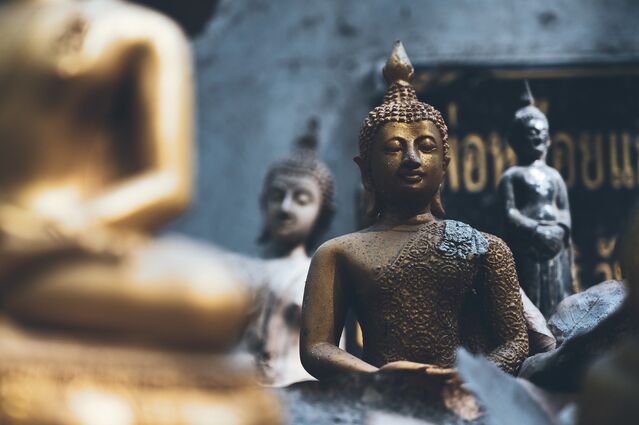Altruism
Can Buddhism Help the Resistance?
We can bridge political divides by understanding our shared humanity.
Posted December 28, 2020

The year 2020 has been rough with us. In the collective sense, we’ve seen disease, death, political strife, racial injustice, and economic adversity cause a great deal of suffering. Personally, life has been very difficult as my wife was diagnosed with stage 2 cancer and is now in the midst of chemotherapy treatments. All of this anguish has taken a significant toll. It has me thinking a lot about different methods we might use to cope, both in the personal/individual sense and for the greater good of societal harmony.
Throughout my adult life, I’ve been drawn to Buddhist ideas that give me a great deal of inner peace and happiness. And I’m not alone. Buddhism, along with mindfulness and meditation, have risen in popularity across the western world in recent years. Given this, I’d like to suggest that Buddhist ideas can also be useful for The Resistance, especially ideas that concern suffering and compassion for others who are different from ourselves.
How exactly? First, Buddhist ideas teach us that psychological pain is a universal aspect of human nature, which is caused by the imperfect ways in which our animalistic brains construct reality. The first and second Noble Truths suggest that suffering is an unavoidable aspect of our existence, and that everyone feels pain in some form, be it through illness, despair, loss, violence, failure, betrayal, and more. All types of suffering are therefore unified in the sense that suffering itself is a universal human experience and because all pains arise due to our species’ psychological limitations. No one is exempt from this—whether one is a beggar or a prince.
These ideas give us a foundation to understand and empathize with each other’s pains and to work hard to achieve liberation and justice for all beings. The story of the Buddha himself (Siddhārtha Gautama) is one of sacrifice. The Buddha was born into immense personal privilege but forsook riches and pleasures in order to discover insights that would help billions of others lead a happier and more peaceful existence. Part of the Buddha’s vision was the way in which individual humans are connected and unified through our suffering, and how we have a duty to help each other whenever possible. This altruistic and compassionate mindset should extend to everyone, even to those we believe to be adversarial or immoral.
The reason that these are important ideas for The Resistance is because they may help us overcome the negative polarization and vicious divisiveness that have afflicted our society in recent times. By recognizing our shared humanity, we may be drawn to solutions that are favorable to everyone, not just to those in our political or social tribe. As I wrote in a previous post, I am disheartened to hear that some liberals are distancing themselves from others (including family or friends) based solely on the fact that those others voted for Donald Trump. I am frustrated and deeply concerned that if we operate this way, then the American experiment will fail. How will we be able to come together, bridge divides, heal our nation’s wounds, and have a cooperative, prosperous future if we continue to double-down on our feelings of antipathy toward political rivals?
I am also concerned at how some liberals describe people mainly or solely as a function of disparate identity groups, some of which are seen as more noble or deserving than others. Why not focus on our shared humanity with a collective quest to overcome suffering? This is the wisdom of Buddhist reasoning. We can serve each other better and achieve our goals for justice and equality by drawing large, inclusive circles instead of drawing distinctions. For those who are passionate about celebrating diversity and acknowledging our different lived experiences and backgrounds, I think we can still accomplish this. But research has shown that calling attention to group-based differences can have unintended negative consequences. It may be the case that we should frame diversity in our backgrounds within the context of broader and deeper commonalities.
Some might suggest that these de-polarization ideas are not specific to Buddhism, rather, they are aspects of many (if not all) world religions. This is where I disagree. Although it would be comforting to think that all major religions encompass these ideas (because religions are such ubiquitous and powerful social forces), I feel skepticism toward the idea that simply being religious is sufficient to unify people, or that merely belonging to any religious tradition makes people more morally good. This is because religions can also ignite fierce tribalism, violence, and bigotry. I think it is more accurate to say that certain types of religious messages can motivate people to be more socially cooperative and altruistic, and those messages tend to focus on universalism rather than esoteric group-based traditions or beliefs.
Some experimental evidence suggests that when people are exposed to Buddhist ideas, they become more compassionate and tolerant (i.e., less prejudicial) towards others who are unlike themselves, compared to when people are exposed to Christian ideas. This result was found for a variety of participants with different religious backgrounds including other denominations (e.g., Catholicism) and also among atheists. This makes Buddhism particularly useful for building bridges among people of many different faiths and worldviews. Because it relies on an agnostic framework, it does not require supernatural or metaphysical beliefs that may conflict with people’s pre-existing religious values (such as the belief in a Christian God or a Heaven), or secular beliefs.
So, can Buddhist ideas cause political cooperation or de-polarization? This remains to be seen. Based on what we know from Eastern philosophy and Western psychology, I think it’s a strong hypothesis and one that interested researchers can certainly study. In the meantime, it may be useful to keep these ideas at the forefront of our minds if we’re going to create a better world.
References
Chang, E. H., Milkman, K. L., Gromet, D. M., Rebele, R. W., Massey, C., Duckworth, A. L., & Grant, A. M. (2019). The mixed effects of online diversity training. Proceedings of the National Academy of Sciences, 116(16), 7778-7783.
Clobert, M., Saroglou, V., & Hwang, K. K. (2015). Buddhist concepts as implicitly reducing prejudice and increasing prosociality. Personality and Social Psychology Bulletin, 41(4), 513-525.
Craig, M. A., & Richeson, J. A. (2014). More diverse yet less tolerant? How the increasingly diverse racial landscape affects white Americans’ racial attitudes. Personality and Social Psychology Bulletin, 40(6), 750-761.
Norenzayan, A. (2014). Does religion make people moral? Behaviour, 151(2-3), 365-384.
Preston, J. L., & Ritter, R. S. (2013). Different effects of religion and God on prosociality with the ingroup and outgroup. Personality and Social Psychology Bulletin, 39(11), 1471-1483.
Schmid, K., Ramiah, A. A., & Hewstone, M. (2014). Neighborhood ethnic diversity and trust: The role of intergroup contact and perceived threat. Psychological Science, 25(3), 665-674.


